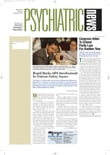A new study finds that brief dynamic psychotherapies can help patients as well as save money. The study comes from Allan Abbass, M.D., an associate professor of psychiatry at Dalhousie University in Halifax, Canada, and colleagues. Abbass reported the study’s results at the annual meeting of the Canadian Psychiatric Association in November. The results are also in press with the American Journal of Psychotherapy.
The brief dynamic psychotherapy that Abbass and his team have found can both pack a clinical punch and save money is called intensive short-term dynamic psychotherapy. It was founded some 20 years ago by Habib Davanloo, M.D., a professor emeritus at McGill University in Montreal. It helps a person address, experience, and deal with blocked emotions and unconscious processes that lead to a wide range of symptom and character problems. Currently there are training programs for it in Halifax, Montreal, Toronto, Vancouver, California, and New York.
Not surprisingly, intensive short-term dynamic psychotherapy is highly regarded by the psychiatrists who use it. However, its purported efficacy has been criticized in other quarters for not having been scientifically documented. So Abbass, a proponent of the therapy, and his colleagues decided to set up a study to see whether they could provide such documentation. They also decided to design the study so that it would reveal whether the therapy is cost-effective when delivered by a psychiatrist in a private clinical setting.
They selected as subjects for their study 89 individuals who had been diagnosed according to DSM-IV criteria with one or more mental disorders and who agreed to undergo intensive short-term dynamic psychotherapy. Of the 89 subjects, 45 (52 percent) had personality disorders, 38 (43 percent) had major depression, 33 (37 percent) had somatoform disorder, 26 (29 percent) had panic disorder, and 21 (24 percent) had dysthymic disorder. The patients were, on average, 40 years of age, and 52 percent were female. All of the subjects received their psychotherapy in a private psychiatric office in Vancouver. Each therapy session was an hour long, and the average course of therapy was 15 sessions.
Treatment Works
To answer the first question—whether intensive short-term dynamic psychotherapy is clinically effective—Abbass and his coworkers had the subjects complete self-report questionnaires before and after therapy. The questionnaires consisted of the Brief Symptom Inventory, a general symptom measurement scale that encompasses depression and anxiety; the Inventory of Interpersonal Problems, a scale that assesses a wide range of interpersonal functioning difficulties; and the Beck Depression Inventory and the Beck Anxiety Inventory, well-established measurement scales of depression and anxiety, respectively.
Abbass and his colleagues then compared the results of the questionnaires completed by the subjects before and after therapy to see whether intensive short-term dynamic psychotherapy had helped them. On each self-report measure, after-therapy levels were lower than pretherapy ones, and the differences in each case were statistically significant. In fact, average scores on each measure decreased from pathological levels before therapy to within normal ranges after therapy.
Thus, intensive short-term dynamic psychotherapy given by a psychiatrist in a private office setting appears to be clinically effective, Abbass and his team concluded.
Is Treatment Cost-Effective?
Abbass and his colleagues then set out to answer their second question—whether intensive short-term dynamic psychotherapy given by a psychiatrist in a private office setting is cost-effective.
The researchers collected data about subjects’ health care costs, unemployment rates, and disability insurance use and costs before therapy as well as after. Then the researchers compared subjects’ before and after therapy levels of health care use, unemployment rates, and disability insurance use. They found, for example, that the average length of stay in the hospital for the subjects went from 10 days during the 12-month period two years before treatment to three days during the 12-month period after treatment. Of the 22 subjects who had been unemployed and out of work on average 60 weeks before therapy, 18 (82 percent) returned to work after therapy (or even before therapy ended). Seventeen of the 18 subjects had been on disability insurance.
Finally, the investigators compared the costs of subjects’ health care and disability insurance use during the 12-month period two years before therapy to the costs of their health care and disability insurance use in the 12-month period after therapy to see whether they could find any differences. The researchers found that the total cost, in Canadian dollars, after therapy was $551,954 less than what it had been before therapy. They then deducted the cost of giving intensive short-term dynamic psychotherapy to the 89 subjects, which was $149,431, leaving a net savings of $402,523.
“This is a remarkable study,” Robert Neborsky, M.D., a clinical professor of psychiatry at the University of California at San Diego, told Psychiatric News. “One of its key points is its naturalistic design. Abbass and his coworkers studied the effect of the treatment on 89 consecutive referrals to a general psychiatry outpatient practice in Vancouver. Although not a perfect design, they have eliminated all criticism of ‘cherry-picking’—that is, only reporting the responses of highly motivated, low-resistance cases. Theirs was a markedly disturbed population, and their results show evidence of substantial change in symptom measures, character measures, and health care and disability costs, using the patient’s retrospective health care demographic compared with their prospective utilization.”
What still needs to be learned, of course, Neborsky pointed out, is whether certain types of patients respond better to intensive short-term dynamic psychotherapy than others do.
“Clearly, there were some patients in the study who showed greater benefit than others,” he said, “and it would be of interest to determine whether they demonstrated the greatest part of the therapeutic variance, and if so, what were their characteristics as opposed to the relative nonresponders.”
The study, “Intensive Short-Term Dynamic Psychotherapy in a Private Psychiatric Office: Clinical and Cost-Effectiveness,” is in press with the American Journal of Psychotherapy. It can be read on the Web at www.psych.dal.ca/istdp/article9.htm. ▪
